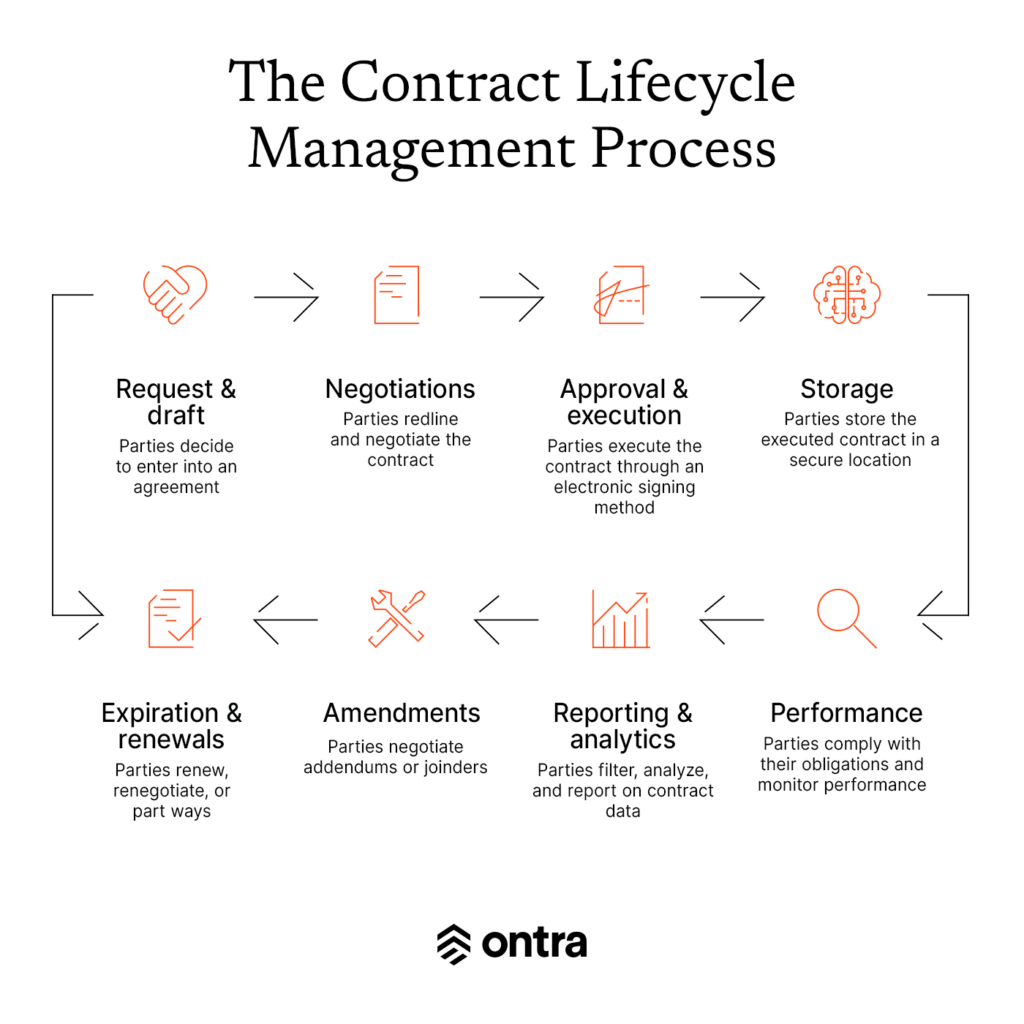Private fund managers are tackling growing contract volumes as they launch new funds, face a challenging fundraising environment, and evaluate more investment opportunities than ever.
Yet most firms’ contract management tools aren’t stepping up to the challenge. Horizontal contract lifecycle management software doesn’t work well for GPs, and instead, firms need a purpose-built solution to effectively manage their wide range of agreements throughout the fund lifecycle. In addition to deploying contract management software for the private markets, firms benefit from following several CLM best practices.
What is contract management?
Contract management is the overall process of a business managing its contracts from inception through termination or renewal. It might also be referred to as contract lifecycle management. However, the abbreviation CLM is most commonly used to refer to a contract lifecycle management software solution.

- Contract request and draft: The parties have decided to enter into an agreement, and one party provides the initial draft.
- Contract review and negotiations: The parties go through several stages of redlining and negotiating the contract provisions. Contract creation and review usually involve several stakeholders, though the complexity of the negotiations depends on the type of transaction and agreement. For example, routine agreements, such as NDAs, require fewer negotiations than complex transactions.
- Contract approval and execution: Once the parties agree to the contract’s wording, they will execute it through an electronic signing method.
- Contract storage: Each party must store the executed contract for their records in a secure yet accessible location.
- Contract performance and obligation management: Each party complies with its obligations and monitors the other party’s performance. This stage can last months or years and often requires the ability to quickly find, search, and review contract provisions.
- Contract reporting and analytics: Businesses benefit from being able to accumulate, filter, analyze, and report on contract data.
- Contract amendments and joinders: Sometimes, parties negotiate addendums to their contracts or use joinders to include third parties in a previously established agreement.
- Contract expiration and renewals: Eventually, the parties approach the end of the contract. They may renew their agreement, negotiate a new contract, or choose to part ways.
Common contracts in the private markets
Private fund managers have an abundance of contracts to manage, from NDAs to side letters and credit agreements. They routinely negotiate and execute:
- Employment contracts
- NDAs
- Vendor contracts
- Software licenses
- Insurance policies
- Joinders
- Non-reliance letters
- Loan or credit agreements
- Merger agreements
- Equity commitment letters
- Equity guarantees
- Organizational documents
- Limited partnership agreements
- Limited liability company agreements
- Operating agreements
Disadvantages of manual contract management
GPs’ contract management has been inefficient and time-consuming for too long, plagued by manual processes, repetitive tasks, and spreadsheets.
Slow, drawn-out contract negotiations
Fund managers often favor speed of execution, particularly with routine contracts like NDAs. While they may expect to take weeks or months to negotiate complex commercial contracts, they often prefer to wrap up routine contracts within a few days. Unfortunately, when managers lack defined processes and contract playbooks, they spend too much time on routine agreements, going back and forth through redundant markups and comments.
Inconsistent contract terms
Fund managers that fail to predefine appropriate terms for routine contracts inadvertently leave their employees and outside parties to decide what to include in an agreement and how to phrase each provision. The firm may have numerous wordings of the same provision across a contract type, giving rise to different (or conflicting) obligations.
Manual obligation management
While spreadsheets are useful tools, they are an inefficient and ineffective way for fund managers to track their obligations to investors, creditors, and other parties. Employees have difficulty quickly surfacing specific obligations, reading the underlying contract provision, and comparing similar obligations across agreements.
Irregular performance audits
Fund managers often have to trust that other parties are complying with their commercial contracts. Tracking another party’s performance, such as whether a vendor is billing the company properly for the delivered products and services, can be extremely difficult. Given that difficulty, firms put off or fail to perform contract compliance audits.
Lack of visibility into expirations and renewals
Legal and compliance teams might have trouble keeping track of when contracts are up for renewal or expire. Many fund managers might inadvertently continue relationships without an effective contract after one expires or miss their opportunity to renegotiate terms before an agreement auto-renews.
Business risks
Inconsistent terms, manual obligation tracking, and a lack of visibility into contract performance can all contribute to legal, financial, and reputational risks. Firms may not fully understand their own obligations or be able to enforce their agreements effectively, which can lead to reputation damage, disputes, lawsuits, and regulatory compliance concerns.
High contracting costs
Inefficient contract management can lead to unnecessary expenses. When fund managers’ employees spend too much time on routine agreements, they effectively spend too much money on the contracting process. Inefficient processes can slow down deals and tarnish potential investor relationships and investment opportunities.
Unusable contract data
Leading fund managers are beginning to realize the value locked within their current and historical contracts. Yet many firms still haven’t digitized their contracts, benchmarked and extracted key terms, or used analytics to spot trends and improve compliance processes.
What is contract lifecycle management software?
Contract lifecycle management software streamlines and, in many cases, automates steps throughout the contract lifecycle while providing centralized storage. CLM software enables parties to negotiate and execute contracts faster and more efficiently by removing traditional barriers, such as emails, draft version confusion, and separate eSignature platforms.
CLM software solutions vary depending on the intended audience. Some offer industry-specific features that will influence businesses’ purchasing decisions. However, many CLM systems are industry-agnostic and not suitable for highly specific or technical businesses, like private funds, asset managers, investment banks, and law firms.
Should private fund managers use a CLM solution?
Yes, private fund managers should leverage purpose-built technology to better manage their contracts.
However, most CLMs available were not created with the private markets in mind. Horizontal solutions lack the features and automated workflows that would benefit fund managers most. Ultimately, adopting an industry-agnostic CLM usually results in disappointment.
A better option is for private fund managers to look for industry-specific contract management solutions. Ontra’s AI-enabled technology platform for the private markets is purpose-built to address the contract workflows of private fund managers. By deploying our negotiation, compliance, and governance solutions, fund managers benefit from:
- Digitized documents
- Tagged and labeled contract provisions
- Structured contract data
- A single, centralized source of truth
- Powerful search and summary capabilities
Learn more about Ontra’s suite of solutions to see how we tailor our AI-supported technology to private fund workflows.
Contract lifecycle management best practices
In addition to deploying purpose-built contract management software, fund managers should prioritize certain best practices.
Maintain a single source of truth
A danger of traditional contract management is the lack of a central repository. Fund managers often store contracts on various local and shared drives. Now, with cloud storage and contract management solutions, firms can save digitized agreements in one place and benefit from better organization, version control, and searchability.
Encourage collaboration and visibility
Fund managers benefit from the ability to quickly surface contracts, compare similar provisions across contract types, track their obligations, and identify another party’s noncompliance. These capabilities require investing in a contract lifecycle management solution with obligation management, search, tracking, and analytics features.
Create contract consistency
Fund managers should foster consistency within their contracts and contract management processes. For contract drafting and negotiations, this often includes standardizing provisions as much as possible through determining preferred and fallback terms. Managers can put together contract playbooks that define their positions for routine agreements.
Employees also benefit from a standard contract negotiation process, which should define each person’s role. It should be clear who is responsible for guiding a contract through the review process, who has approval power, and who will sign the agreement on behalf of the manager.
Expedite the contract execution process
Fund managers often want to shorten the turnaround time for routine contracts. They can do so by taking advantage of legal technology, contract automation, and, in some cases, legal outsourcing.
Firms tackling high volumes of repetitive contracts may benefit most from automation and outsourcing, which can cut turnaround times by 50% like Ontra did for Fir Tree Partners.
Other firms do best by bringing a negotiation solution in-house, like Ontra’s Accord. Firms with the capacity to handle routine agreements in-house can still leverage technology with AI outputs, automation features, streamlined workflows, and eSignature integrations.
Which private markets teams can use contract management software?
Numerous functions within a private fund manager or asset management firm can benefit from contract management software, including:
- In-house legal: In-house counsel often own the contracting process and might use CLM software daily, either for contract creation or obligation management.
- Compliance: The chief compliance officer and their team would access the CLM for obligation tracking and regulatory purposes.
- Human resources: People teams are often responsible for overseeing employment contracts and independent contractor agreements.
- Investor relations: The investor relations team plays a critical part in raising capital and facilitates contracts signed with investors, such as limited partnership agreements, side letters, and subscription agreements.
- Investment teams: These teams often interact with documents associated with a potential investment opportunity, such as NDAs. They might also need to reference contracts associated with the purchase of an asset, such as purchase agreements.
- Procurement: Large enterprises often have a team dedicated to finding and managing goods and service vendors. This team would use contract management software to create contracts and audit vendor performance.
- Finance: Finance departments often need visibility into contracts for billing and audit purposes.
Adopting a contract management solution requires change management
CLM discussions often focus on choosing the right technology, particularly with the growing integration of Generative AI in CLM systems. However, adopting a comprehensive contract management position also represents an attitude shift.
Adopting a CLM system involves improving processes to make contracting more efficient and to empower decision-making throughout the firm. This shift could entail adopting contract templates, standardizing provisions in contract playbooks, or clarifying who has drafting authority and final approval.
CLM software can help with these steps, but it doesn’t transform a company’s contract management alone. Private fund managers have to plan and navigate change management to ensure the end users are aware of any new processes and well-trained on the new CLM software.
Ontra: contract management for the private markets
Ontra is not a CLM system — it’s much more. Our private markets technology platform offers several contract management solutions for different phases of the fund lifecycle. Depending on your firm’s pain points, some or all of our negotiation, compliance, and governance solutions may be the right fit to digitize your agreements, centralize structured contract data, and quickly surface insights.
To learn more about contract management with Ontra, schedule a demo.







